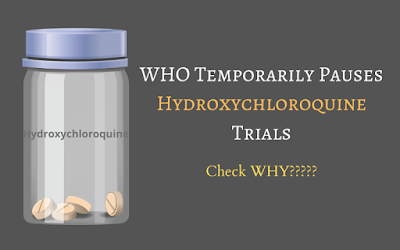Hydroxychloroquine trial has come to a standstill while WHO is reviewing the data collected from the ongoing trials and studies on the benefits and harms of hydroxychloroquine sulfate, an anti-malaria drug in the treatment of COVID-19.
During a press conference, WHO’s Director-General Tedros Adhanom said, "The Executive Group of the Solidarity Trial, representing 10 of the participating countries, met on Saturday and has agreed to review a comprehensive analysis and critical appraisal of all evidence available globally."
In the international solidarity trial, WHO has been studying the efficacy of various medications like remdesivir, hydroxychloroquine, lopinavir ritonavir in fighting off COVID-19.
As per Lancet observational study on May 22, over 100,000 coronavirus patients who were treated with hydroxychloroquine showed no signs of recovery and were even at a higher risk of death and irregular heartbeats.
The final word on the benefits and side effects of hydroxychloroquine will be put out once the Data Safety Monitoring Board has reviewed the available data and evidence.
For the patients who were randomized to HCQ treatment will continue to take the medicine until they finish their course of therapy. This drug is considered to be safe to use on patients with malaria or autoimmune diseases.
The medical community also stands divided in this matter. While some countries are reporting more evidence on the potential harms and limited benefits of hydroxychloroquine, countries like Brazil, the US, and India are continuing with its widespread use. US President Donald Trump sought supplies from India and uses HCQ as a preventive therapy against coronavirus.
On the same day as the Lancet study was published, the clinical research body of India ICMR explained the use of hydroxychloroquine as prophylaxis against COVID-19. They recommended the use of HCQ for frontline workers, healthcare workers, and policemen as a preventive therapy. However, keeping the contraindications in mind, they suggested one EPG during the course of therapy. ICMR also presented three observational studies from government hospitals showing that the healthcare workers who took HCQ had fewer chances of developing SARS-CoV-2 infection in comparison with those who were not on prophylaxis.
WHO has warned physicians against the use of unproven medication medications on the COVID-19 patients and also cautioned people not to use any medications either.
However, WHO has not prohibited the countries from using such drugs. Every country is free to act how they want but must follow the guidelines of their respective health ministries.
There are probably more than 150 case studies and trials going worldwide to determine the efficacy of hydroxychloroquine sulphate in COVID-19 treatment.
As a part of WHO’s international Solidarity Trial, more than 3500 patients have been recruited from over 17 countries. Around 400 hospitals are recruiting patients daily to perform the trial. The largest trial is going in the United Kingdom that is examining the possible effects of HCQ on the death risk in COVID-19 patients.
The final decision of the Data Safety Monitoring Board on the use of hydroxychloroquine may be out by mid -June.

I was diagnosed as HEPATITIS B carrier in 2013 with fibrosis of the
ReplyDeleteliver already present. I started on antiviral medications which
reduced the viral load initially. After a couple of years the virus
became resistant. I started on HEPATITIS B Herbal treatment from
ULTIMATE LIFE CLINIC (www.ultimatelifeclinic.com) in March, 2020. Their
treatment totally reversed the virus. I did another blood test after
the 6 months long treatment and tested negative to the virus. Amazing
treatment! This treatment is a breakthrough for all HBV carriers.